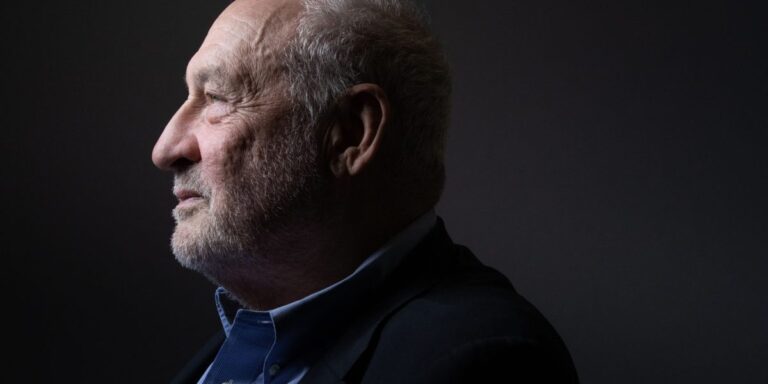
Stiglitz says the protest movement that has taken over his institution and many others “hits the mark” and recalls his own history as a civil rights activist in the 1960s. “It may seem hard to believe,” says he, “but I was present at the march on Washington in August 1963, with Martin Luther King. And I was there when he gave the ‘I have a dream‘ speech.” It had an influence on his thinking as a young man, he says, and “a huge impact on the direction of our country, at least for a while.”
This sad tone fits much of Stiglitz’s career, as the left-wing economist and author finds himself in increasingly lonely company: the pro-capitalist progressive. Opinion polls indicate widely A disaffection towards capitalism among some millennials and more Gen Zers, as evidenced by the surprising electoral successes over the past decade of so-called democratic socialists Alexandria Ocasio-Cortez and Bernie Sanders. But Stiglitz has always maintained that socialism is not the solution; on the contrary, well-regulated capitalism is absolutely necessary. At the same time, he denounced the far-right turn in American political and business culture, to the point of doubting the impact of Reverend King’s famous speech.
“Neoliberal capitalism is devouring itself,” says Stiglitz Fortune, arguing that this rewards dishonest people and leads to a lack of trust. He says this is unsustainable because it places self-interest above any sense of community and the broader interests of society. “We’re seeing things start to unravel now,” he adds.
Countries everywhere have not done enough to guard against the neoliberal turn, he argues, and countries that have not done enough to protect their citizens from the market have seen the rise of populism and authoritarianism. He obviously fears Trump’s return in November. “I think it will be terrible for the economy. And even worse, for our fundamental rights. But he also says Americans are underestimating the international reaction. Businesspeople abroad have expressed a “kind of nervousness” about Trump’s re-election, he said. “And the closer we get to the election, the more nervous they say they feel. »
Freedom for wolves
The title of Stiglitz’s book is an implicit callback to one of Regan’s favorite thought leaders, the Austrian economist. Frédéric Hayekwho preached the efficiency of free markets especially in his significant work”The road to serfdom.” As Stiglitz writes, freedom has more than one meaning, and in 21st-century America, there is “freedom for the wolves and death for the sheep.” (Stiglitz notes that this is a paraphrase of Isaiah Berlinan anti-communist and pro-capitalist liberal intellectual of the Cold War era.)
In Stiglitz’s book, he argues that the country’s neoliberal shift since the days of Ronald Reagan has made the American dream even further out of reach for everyone, especially Generation Z. Fortune the media likes to tell “good stories” like 19th-century young adult novelists Horatio Alger: rewarded upward mobility, reinforcing the idea that anyone can succeed if they work hard. “But from a social science perspective, the question is how likely it is, and that’s very rare,” he adds, citing data showing worse outcomes for the United States than for any other country. other advanced economy. “I would say it’s a myth.”
But the American dream is also about freedom, which includes the absence of danger and the freedom to realize one’s potential. “And once again, America is doing worse,” he said, specifically citing the epidemic of gun violence gripping the country. “An important freedom is the absence of fear. And from a young age, we tell our children to be afraid.
We must listen to our children, he adds: “The gap between what they have been told and reality is very large. When they enter the workforce, being raised on notions of the American dream, he adds, “they know it’s going to be very difficult to own a home…they know that a college graduate Average college student has about $30,000, $40,000 in student debt, so it’s going to be a noose around their neck for a long time.
Stiglitz refuses to comment on the issue of excessive police brutality in repressing protests in Colombia, citing the long tradition of peaceful protests from Martin Luther King to Mahatma Gandhi, but also a tension with civil disobedience that can be justified by a specific cause. . “I am aware of the tensions between different freedoms,” he says, adding that he generally wants civil dialogue that results in a peaceful resolution.
The coercion of the traffic light
To remedy this, Stiglitz uses the word “coercion” in his book, but he offers a potentially illuminating metaphor: the red light. “You can’t cross an intersection when it’s red. And if you do, you will see all kinds of consequences. You will be arrested. It is therefore unambiguously coercion. But in New York or London, without red lights, we couldn’t move at all. And you would be in a dead end.
When Fortune discusses the biggest current economic blockage, the real estate market, Stiglitz refers to his previous work.
While cautioning that he has not studied the current real estate market closely, he has studied mortgage financing, a “special system” in which the government bears about 90% of the risk through underwriting, unchanged since the great crash of 2008. “Remarkably, for me, (is) for 16 years, we haven’t really sorted out the financial part.” We still have a system in which much of the profit goes to the financial sector, but the government continues to bear most of the risk. In other words, if it were a red light, it might flash yellow without directing traffic effectively.


